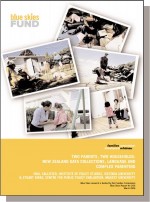Recently there has been a lot of media attention focused on the problem of youth gangs and associated street violence. Solutions usually involve talk about council initiatives, access to education, more stringent policing and the role of social agencies.
In a recent newsletter entitled “The Fatherless Generation” however, Dr. Muriel Newman of the New Zealand Centre for Political Debate, states that “little has been said about the underlying causes of the problem”.
In the newsletter, she turns the focus on personal parental responsibility, and the importance of a stable home with two loving parents. Using quotes from youth court judges and university professors, she makes a strong link between crime and the absence of fathers in children’s upbringing.
“This is why I am passionately opposed to public policy and practice that encourages family breakdown and excludes biological fathers. Removing (fathers) from the lives of children leaves them extremely vulnerable to abuse, neglect and failure” states Dr. Newman.
She goes on to say that New Zealand’s decision makers, driven by a feminist agenda, are implementing a raft of policies that end up excluding men and fathers from the lives of their children. This drive for equality for women, is actually undermining men’s position in society according to Newman.
According to Newman, New Zealand needs inclusive policies where men and women play an equal role in society.
New Revenue Minister Peter Dunne is willing to waive up to $500 million of unpaid child support debt. More than half of the record one billion dollar debt consists of penalty fees, which could be wiped under new legislation soon to be introduced to parliament.
The bill includes provision for penalty fees to be waived, provided that liable parents enter some kind of repayment arrangement for their existing debt. Expatriate liable parents accounted for the highest levels of unpaid debt; more than $312 million of the total owed.
A Christchurch father who said he was “squeaky clean”, still owed $25,000 at one point, most of which was penalties incurred because Inland Revenue thought he was paying the wrong rate. “The tax department cannot pick up a mistake for about six months and they continue to charge you penalties” he said.
“If you try and work it out they will not negotiate with you until you have paid the penalties. That’s why so many guys are in debt”. It is hoped the Bill will appear in parliament before Christmas.
A study sponsored by the Families Commission’s “Blue Skies’ research fund found that available family data in New Zealand understates the contribution of separated fathers.
Victoria University researcher Paul Callister and Massey University’s Stuart Birks examined family data collection methods in New Zealand and found they do not accurately describe the living circumstances of children.
“There is considerable diversity in parenting arrangements, and one major group is often overlooked. These are the children of separated biological parents who, to varying degrees, have two active parents and two households.”, says the study.
The study comes at a time when Statistics New Zealand, the government-funded but independent statistics department, is conducting a review of official family statistics with an eye on improving family data.
Callister and Birks also take issue with terms often used to describe family types in the media and official documents. They conclude:
 “As well as there being gaps in data collections, the language of research and policy debates is lagging behind the changes in family types. Many of the words currently used, such as ‘non-custodial’ parent and ‘non-resident’ parent have connotations of exclusion rather than inclusion. In some situations this will reflect reality, but in others the terms are misleading.
“As well as there being gaps in data collections, the language of research and policy debates is lagging behind the changes in family types. Many of the words currently used, such as ‘non-custodial’ parent and ‘non-resident’ parent have connotations of exclusion rather than inclusion. In some situations this will reflect reality, but in others the terms are misleading.
“While most researchers try to differentiate between single-parent households and single-parent families, the term ‘single-parent family’ can still be found in many research publications even when it is quite clear that the children involved have two active parents.”
Father & Child Trust has made a submission to Statistics New Zealand for their current review, emphasising that the lack of reliable data about fathers’ parenting contribution and situation may prevent necessary changes in the delivery of social and community services, and makes it hard for community organizations to obtain funding for working with fathers.
National Children’s Day organisers advise that ‘Children’s Day’, which used to be held in October, has been shifted to March, with the next one on the 4th of March 2007.
 ‘Children’s Day’ was set up by a coalition of mainly child protection agencies such as Child Youth and Family and Barnados six years ago, and encourages people to organise local events on the day and do something special with children.
‘Children’s Day’ was set up by a coalition of mainly child protection agencies such as Child Youth and Family and Barnados six years ago, and encourages people to organise local events on the day and do something special with children.
The first gender-based statistics released by the Family Court since 1990 indicate that 65% of day-to-day care orders (previously custody orders) are awarded to mothers, 11% to fathers and about 12% to another party. 12% share the day to day care order.
Only 5.4 % of all day to day care orders are made by a judge at a defended hearing. The vast majority of parenting orders, 74%, are reached by consent between parents. with the remaining 20.6% by a judge where only one parent attends. The new figures cover nearly half of 5865 parenting orders for the previous year ending June 2006.
Principal Family Court Judge Peter Boshier suggests the figures indicate that “Mothers and Fathers seem to be saying that they prefer it that mothers care for children in the vast majority of cases. …In all probability what the Family Court is doing is mirroring social reality”.
Judge Boshier pointed out that judges awarded 18.4% of day-to-day care to fathers in defended hearings, a higher percentage than the 11% father care agreed to by consenting parents.
The Department of Statistics stopped collecting gender data in 1990 when sole maternal custody was 74%, sole paternal custody 13 %, and joint custody 9%. The new figures were requested by the NZ Herald.
A report released on Mon 25 September by Early Childhood Education Researcher Sarah Farquhar has revealed that less than 1% of Early Childhood Educators in New Zealand are men.
In her report she calls for open debate on men in early childhood education to remove what she reports as inherent sexism and fears of paedophile accusations, in the field.
A day later, the Early Childhood Council Chief Executive Sue Thorne called for a Government-led initiative to encourage more men into the profession.
She commented in a Christchurch Press article (Sept 26) that many men felt unwelcome in childcare and that the paedophile ‘hysteria’ of the 1990’s had resulted in existing male educators leaving the profession and potential male trainees avoiding the profession.
Other researchers in the field however, have identified other barriers and suggest that the perceived public and media hysteria regarding sex abuse and paedopilia are actually masking the effect of issues such as low pay, low social status of the work and perception of EC education as a ‘women’s career’ as barriers to men entering the profession.
Researchers from Princeton University have discovered significant changes in the brain structure of male Common Marmosets on becoming a father.
Marmosets are a primate species where the fathers stay involved with their offspring.
The changes in brain structure are triggered by hormonal changes also found in human males with a pregnant partner.
 Connections between neurons increased in an area of the brain responsible for memory and planning. Receptor numbers for the hormone ‘vasopressin’ also increased.
Connections between neurons increased in an area of the brain responsible for memory and planning. Receptor numbers for the hormone ‘vasopressin’ also increased.
Some of these changes reversed once the young became independent, but could be observed again if a new one was born.
Father & Child understands that mediation between Air New Zealand, Qantas and several complainants has failed regarding changing the current policy of moving males away from unaccompanied children on airplanes .
One of the complainants, who had withdrawn from the mediation process before it came to an end, intends to take the matter to the Human Rights Review Tribunal.
After hearing the case the Tribunal will issue a finding about whether the practice of asking men to move seats when sitting next to an unaccompanied child is a breach of the Human Rights Act .
A southern region “champions gathering” of successful applicants for the S.K.I.P. programme was held recently in Christchurch.
The Father & Child Trust presentation was very warmly received by the other groups. The 10 minute talk was focused around the fact that every family has a father somewhere in the mix, and one of the key factors in positive parenting is collective parenting.
The Father & Child Trust module is currently being constructed, and should be ready for presenting in the next few weeks.
Five years after having been forced to give up a drop-in place for father for funding reasons, the Christchurch-based Father & Child Trust is once again easily accessible for fathers and children dropping in.
The new ground-floor premises provide room for resource display, meetings and playing children without having to combine office and drop-in space in the same room.
For the first time since its creation in 1997 the Trust can offer ground floor facilities for drop-ins, access to which is entirely under its control. And not since 1999 has the Trust been able to provide regular staffing at least during office hours.
The expansion has become possible due to financial support from the Christchurch City Council and a contract with the Ministry of Social Development for the delivery of a positive parenting programme.
For the last 2.5 years the Trust had been located at the Plunket regional headquarters, where space became too small for the Trust’s needs.







